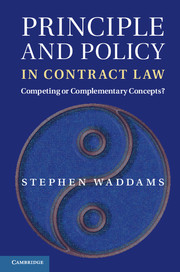Book contents
- Frontmatter
- Contents
- Table of Cases
- Preface
- 1 Introduction: empire of reason, or republic of common sense?
- 2 Intention, will and agreement
- 3 Promise, bargain and consideration
- 4 Unequal transactions
- 5 Mistake
- 6 Public policy
- 7 Enforcement
- 8 Conclusion: joint dominion of principle and policy
- Select Bibliography
- Index
- References
1 - Introduction: empire of reason, or republic of common sense?
Published online by Cambridge University Press: 07 September 2011
- Frontmatter
- Contents
- Table of Cases
- Preface
- 1 Introduction: empire of reason, or republic of common sense?
- 2 Intention, will and agreement
- 3 Promise, bargain and consideration
- 4 Unequal transactions
- 5 Mistake
- 6 Public policy
- 7 Enforcement
- 8 Conclusion: joint dominion of principle and policy
- Select Bibliography
- Index
- References
Summary
‘[I]f LAW be a science’, said Sir William Jones in 1781, ‘and really deserve so sublime a name, it must be founded on principle, and claim an exalted rank in the empire of reason’. In Goodisson v. Nunn (1792), Lord Kenyon, in dealing with the then very controversial question of when contractual covenants were to be considered independent of each other, was faced with old cases apparently requiring a result that he thought was unjust. He was able to find that the old cases had impliedly been overruled by more recent cases:
The old cases…have been accurately stated, but the determinations in them outrage common sense…I am glad to find that the old cases have been over-ruled; and that we are now warranted by precedent as well as by principle to say this action cannot be maintained.
These two statements, eleven years apart, invite comparison. Both appeal to ‘principle’, but the word is used with different connotations. Jones spoke of principle as an essential component of the claim of the law – a claim of which Jones evidently approved – to be a rational science. There is no explicit place in this concept for individual judgment on the part of judges or of writers of what legal rules would, on general considerations, be beneficial or desirable in the interests of justice to the parties to a particular dispute or in the interests of society at large in the future. Lord Kenyon, on the other hand, though he also concludes his statement with an appeal to ‘principle’, was evidently motivated by a desire to avoid injustice to the defendant in the particular case, and to establish a rule that would, in his judgment, be beneficial in future cases. Personal opinion was engaged, as is shown by the use of the very strong phrase in reference to the old cases, that they ‘outrage common sense’, and in the next words, ‘I am glad to find that the old cases have been over-ruled’.
- Type
- Chapter
- Information
- Principle and Policy in Contract LawCompeting or Complementary Concepts?, pp. 1 - 21Publisher: Cambridge University PressPrint publication year: 2011



